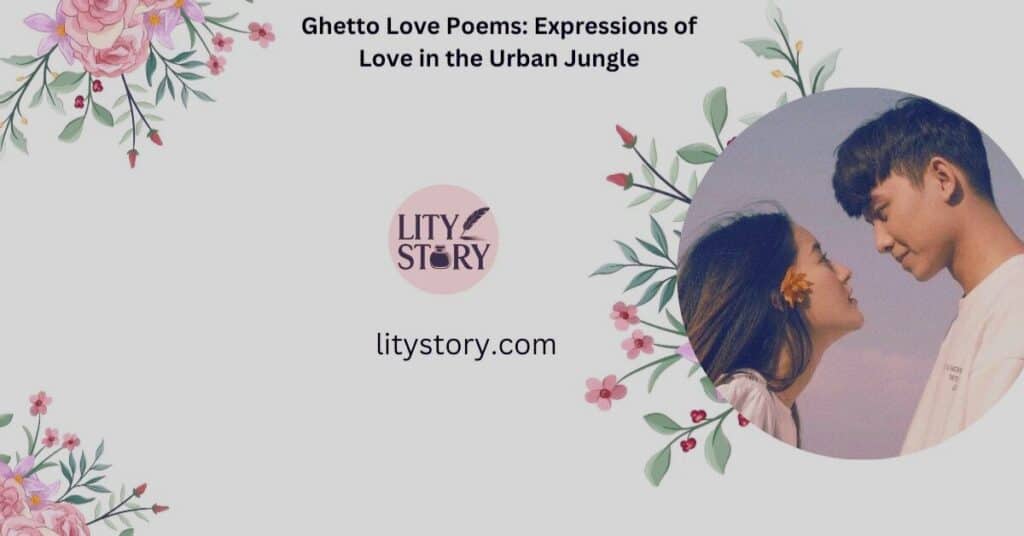Ghetto love poems provide a unique perspective on love that deeply intertwines with urban life through their raw emotion and gritty narratives.These poems depict the beauty, struggle, and resilience of love in the heart of the city. Through vivid imagery, personal stories, and a blend of dialects, they paint a picture of love that survives—and even thrives—in the most challenging environments.
In this comprehensive article, we’ll explore what makes ghetto love poems so powerful, how they’ve evolved in urban settings, and why they continue to resonate with readers today.
The Power of Ghetto Love
Love serves as a universal theme, but ghetto love, in particular, infuses the struggles, hopes, and dreams of city life. Urban love differs; it shapes itself with the sounds of the streets, the pulse of a gritty environment, and the complexities of city life. In a world where survival is often the primary focus, resilient love emerges as something incredibly powerful.
Love and Struggle in the Urban Setting
In many urban environments, the struggles of daily life—financial hardship, crime, and a lack of opportunity—are part of the everyday experience. Yet love still finds a way to bloom in these settings. Ghetto love poems capture this balance of hardship and affection, showing that love isn’t just a romantic ideal, but a force that helps people survive.
- Fact: Cities with high poverty rates often produce more vibrant forms of art, including music and poetry, that reflect the realities of life in these environments. Love in urban settings often mirrors this, combining harsh realities with deep emotional connection.
Breaking Stereotypes: The Beauty of Ghetto Love
People often stereotype urban life as cold or harsh, but love within these settings defies that notion. These poems show that, even in a world of struggle, love is a driving force. Ghetto love poems bring out the tenderness, vulnerability, and strength of relationships formed under pressure.
“Love is not always a bed of roses. In the ghetto, love is a rose growing between cracks in the concrete.” – Emily Verse
Ghetto Serenade: Love in the Streets
A ghetto serenade is the ultimate expression of love in the city. It’s a declaration that, despite the noise and chaos around them, love is the one constant. These poems are often set to the sounds of the streets—sirens, traffic, and city bustle—creating a rhythm that mirrors the heartbeat of urban life.
Meaning of Ghetto Serenade
A ghetto serenade represents the simplicity and purity of love in the midst of urban chaos. It’s the city’s love song, unpolished yet deeply heartfelt.
Inspiration Behind Ghetto Serenade
This form of poetry often stems from real experiences in urban environments, where love must contend with external struggles. The city provides the backdrop, but it’s the relationship between the lovers that shines through.
- Case Study: In the poem “Ghetto Serenade,” Emily Verse writes about a man singing to his lover beneath the sound of passing trains and police sirens. His voice is quiet, but his words speak volumes, showing that love persists even when the world seems to drown it out.
Urban Lullaby: A Song for the Soul
An urban lullaby is another common theme in ghetto love poems. It’s a soothing song of love, one that offers comfort and peace amid the city’s chaos. These poems reflect the tender moments of connection that help lovers find calm even in the storm of city life.
Meaning of Urban Lullaby
Lovers share urban lullabies as quiet moments of peace in a noisy world. They speak to the idea that love can provide solace, even when everything else feels overwhelming.
Inspiration Behind Urban Lullaby
These poems often draw inspiration from the late-night conversations or shared moments of quiet between couples in the city. The imagery frequently contrasts the loud environment with the soft and intimate connection between the lovers.
“In the city’s loud hum, your voice is my quiet. In your arms, I hear the lullaby of love.” – Emily Verse
Do You Read Me?: Love Through the Struggle
The question “Do you read me?” in urban love poems refers to whether lovers understand and connect with each other despite the noise around them. It’s about more than just communication; it’s about finding true understanding in an environment where it’s easy to feel lost.
Meaning of Do You Read Me?
This phrase captures the need for deep communication in urban love. It asks whether lovers can hear and understand each other through the distractions of the world around them.
Inspiration Behind Do You Read Me?
These poems draw inspiration from the challenges of maintaining relationships in a fast-paced, often disconnected city environment and explore the idea that love requires effort to be heard and understood.
- Fact: In urban environments, relationships often face more external pressures than those in quieter settings. These pressures make communication even more vital.
Example Poem
A short excerpt from a poem by Emily Verse:
“Do you read me, love?
Beneath the subway’s rumble
In the night’s quiet murmur
Do you hear my heart?”
Take Me On Your Struggles: Love as a Journey
The poetic theme *Take Me On Your Struggles* portrays love as a journey through hardship. These poems explore how love grows and strengthens through adversity. It’s about partners supporting each other through the ups and downs of life in the city.
Meaning of Take Me On Your Struggles
This theme expresses the idea that love is a partnership, where both people share their burdens and lift each other up through tough times. In the context of ghetto love, this often means surviving together in environments that are not always supportive of relationships.
Inspiration Behind Take Me On Your Struggles
The idea that love becomes stronger in the context of struggle inspires many of these poems.They reflect the challenges faced by couples in urban settings, where financial or social issues often strain relationships but also forge stronger bonds.
Example Poem
“Take me on your struggles,
and I will carry the weight.
Together, we’ll rise above the streets,
and find our love’s true fate.”
The Role of Rhythm and Language in Ghetto Love Poems
One of the defining features of ghetto love poems is the rhythm. The cadence of the city—its noise, its energy—finds its way into the poetry. These poems often use urban slang, dialects, and unconventional structures to convey authenticity.
Urban Dialect and Slang in Poetry
Ghetto love poems often include street slang or city dialect, which not only adds authenticity but also makes the poems more relatable to readers from similar environments.
- Fact: The use of local dialect in poetry can strengthen emotional impact, making the poem feel more intimate and connected to a specific place or experience.
Themes in Ghetto Love Poems
There are several key themes that consistently appear in ghetto love poems, each reflecting different aspects of love in urban settings.
Love and Survival
Writers often depict love as a source of strength that helps people survive the challenges of city life.This theme shows how love can be a form of resistance against the hardships of urban living.
Trust in a Broken World
Many ghetto love poems explore the idea of trust in environments where it’s difficult to trust anyone.Challenges test the strength of a relationship, but those who overcome them find a deeper connection.
Love as Resistance
In cities where people are often struggling against societal pressures, love itself can be an act of rebellion. Ghetto love poems frequently depict love as a force that pushes back against the hardships of the world.
Beauty in the Struggle
These poems also reveal the beauty people can find in even the most difficult situations. The idea that love is beautiful because it endures through struggle is a common thread.
Famous Ghetto Love Poets and Their Work
Several poets have made a significant impact in the genre of ghetto love poetry. These poets use their unique voices to convey the emotional complexity of love in urban settings.
Emily Verse
Emily Verse is a key figure in the world of ghetto love poetry. Her work often focuses on themes of survival, trust, and resilience, using urban imagery to bring her poems to life.
- Fact: Emily Verse has published several poetry collections that explore love in urban settings, including Ghetto Serenade and City Love.People praise her work for its raw emotion and authentic voice.
How to Write Your Own Ghetto Love Poem
Writing your own ghetto love poem is about tapping into the raw emotion of urban life and love.Here are some tips that will help you get started.
Use Authentic Language
Don’t be afraid to use the language of your surroundings. Slang, local dialect, and even urban sounds can enhance the authenticity of your poem.
Focus on Emotion
Ghetto love poems are all about emotion—whether it’s joy, pain, or struggle. Let your feelings guide your words.
Experiment with Structure
Feel free to break traditional poetry rules. Ghetto love poems often use unconventional structures that mirror the unpredictability of city life.
Use Vivid Imagery
Urban love is full of striking contrasts—light and dark, noise and silence. Use imagery to paint these contrasts in your poem.
Conclusion
Ghetto love poems continue to resonate because they speak to the heart of what love is: enduring, resilient, and often born from struggle. In urban settings, where life moves fast and challenges arise, love provides strength and beauty.Through their vivid language and emotional depth, these poems capture the true essence of love

Litystoyr is the creative mind behind Litystory, a blog dedicated to helping readers navigate the complexities of canceling and activating various subscriptions. With clear, actionable advice, Litystoyr simplifies the process for users looking for easy solutions to subscription management and more.








